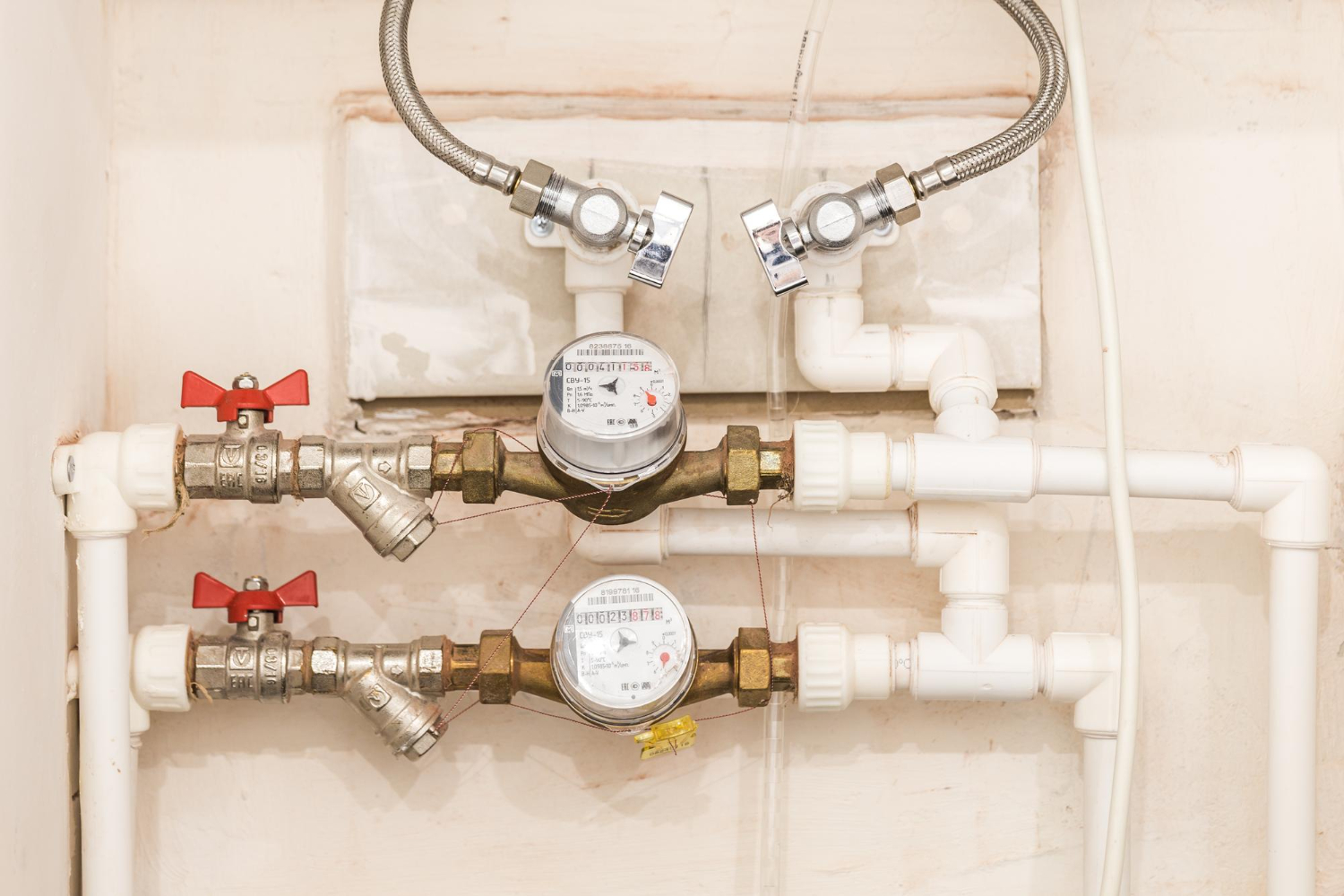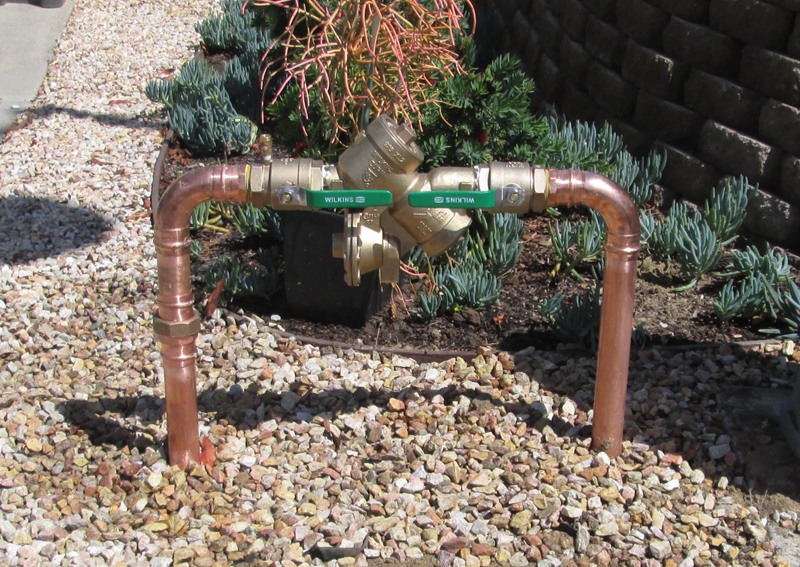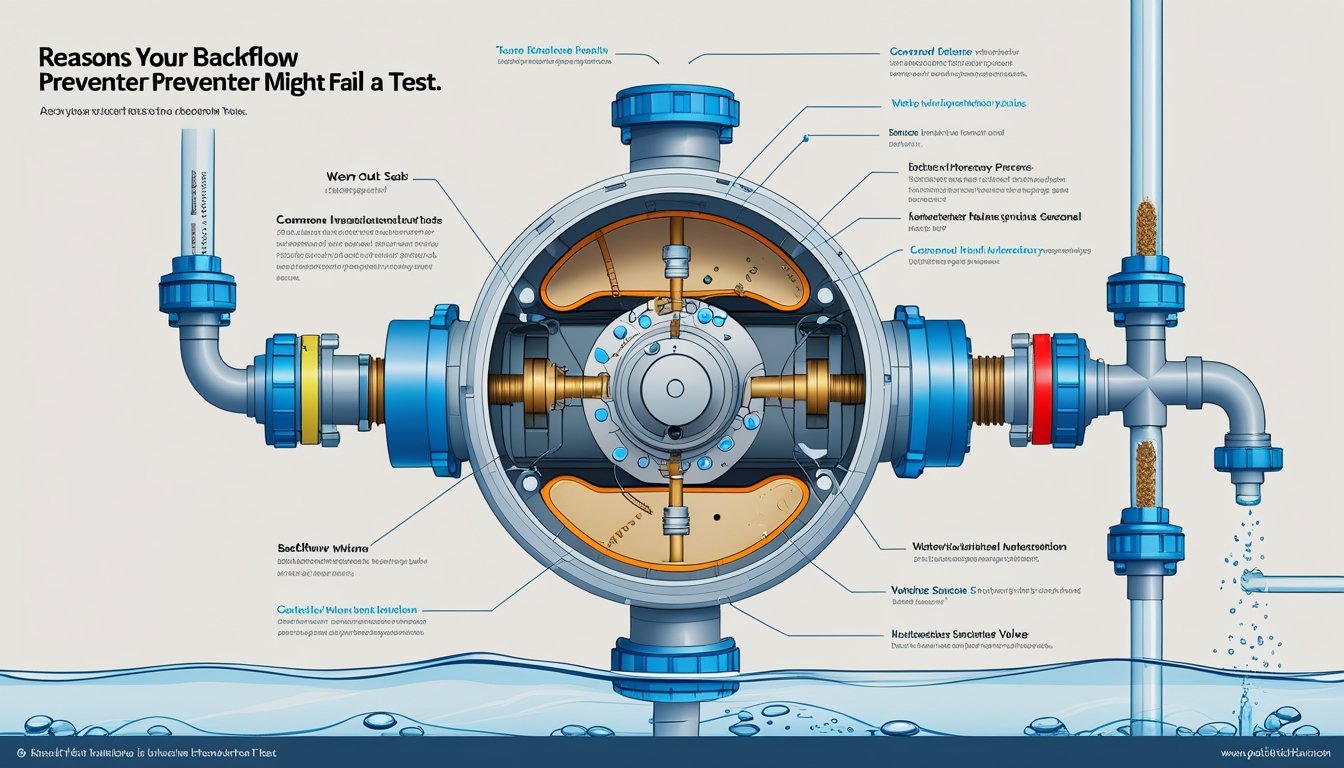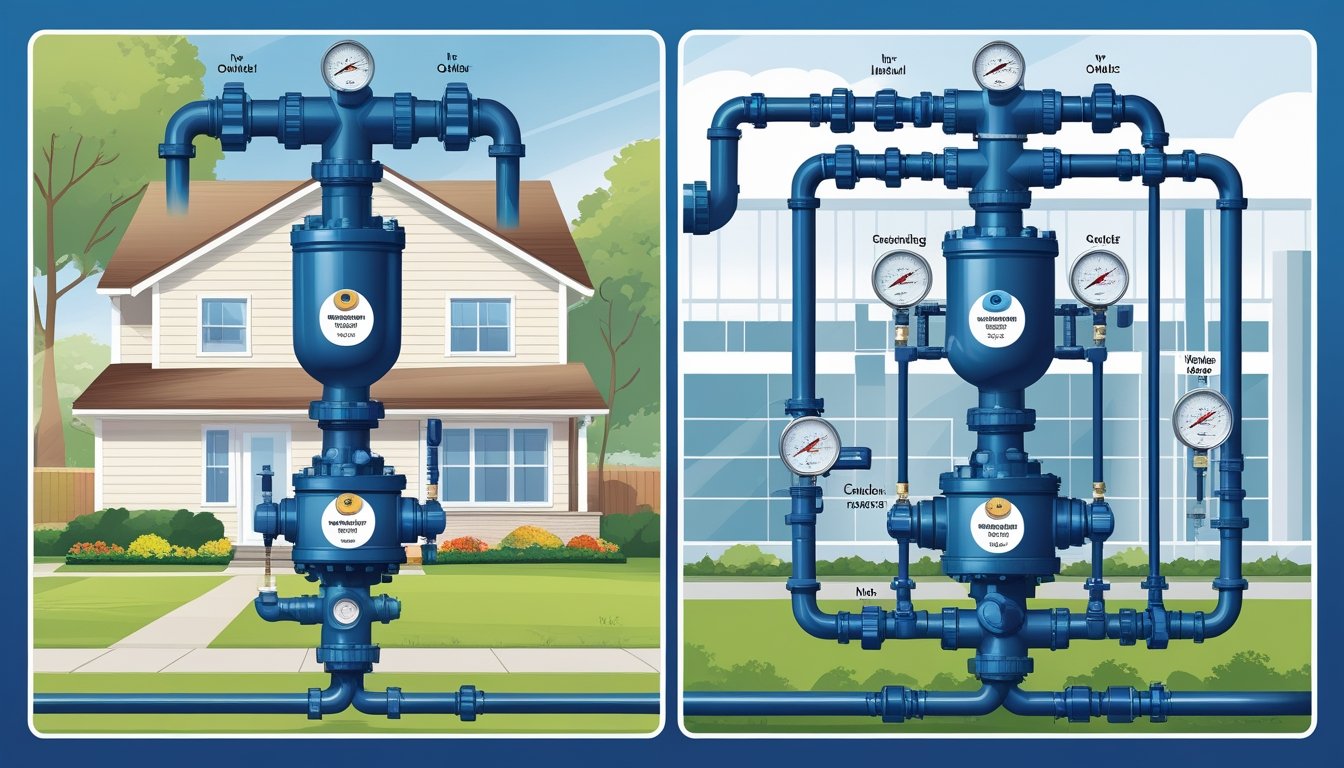Backflow testing requirements help ensure that contaminated water doesn’t enter your clean water supply. For commercial properties, this testing confirms that backflow prevention devices are working as intended, protecting people from serious health risks.
When water flow is disrupted, due to pressure drops or valve failures, there’s a chance that dirty water can reverse direction and mix with potable water. Backflow testing checks for this risk and verifies that safeguards are holding up.
Certified testers evaluate pressure levels and device function, usually completing the test in under an hour. Annual testing is often required by law and helps maintain both safety and compliance.
In this article, we’ll break down when testing is needed, what’s involved in the process, and how to stay up to date with regulations through the topics below:
- Understanding backflow and its risks
- San Diego backflow testing requirements for commercial properties
- Backflow testing procedures and compliance requirements
- How to respond to backflow incidents and prevent future risks
Let's dive in!
Understanding backflow and its risks
Backflow poses a serious risk to public and private water systems by allowing contaminated water to reverse flow and enter clean drinking water supplies. This can occur during changes in water pressure, such as during main breaks, firefighting, or system maintenance, events that create conditions where water moves in the wrong direction.
Once contaminated water enters the potable supply, it may carry hazardous substances that compromise health and safety. These risks make backflow prevention and testing a critical part of water system management, especially in commercial buildings with complex plumbing infrastructure.
What is backflow?
Backflow occurs when water flows in the opposite direction than intended in a plumbing system. Instead of moving clean water from the supply line into a building, the flow is reversed — potentially drawing in pollutants from cross-connections or non-potable sources.
There are two primary mechanisms that cause backflow:
- Back-siphonage: this happens when a sudden drop in supply-side pressure creates a vacuum effect, similar to sucking liquid through a straw. It can pull contaminated substances into the clean water line. Common triggers include firefighting operations, broken water mains, or rapid demand from nearby users.
- Back pressure: occurs when the pressure in the building’s plumbing system exceeds the pressure in the public supply line. This is common in systems with pumps, boilers, elevated tanks, or industrial processes. The excess pressure forces potentially polluted water back into the main supply.
Health risks of backflow contamination
When backflow occurs, it can introduce a wide range of harmful contaminants into the drinking water supply, including:
- Chemical pollutants: Pesticides, cleaning agents, industrial chemicals, or pool treatment compounds
- Biological contaminants: Bacteria, viruses, parasites, and raw sewage
- Physical intrusions: Sediment, rust particles, organic debris, or metals from corroded pipes
Exposure to these substances through drinking, cooking, or hygiene activities can lead to:
- Acute symptoms such as nausea, vomiting, diarrhea, or fever
- Chronic health problems, especially for immunocompromised individuals
- Waterborne diseases caused by pathogens like E. coli, Giardia, or Legionella
A single backflow event can compromise the health of building occupants and, in some cases, the surrounding neighborhood, particularly in densely populated areas or multi-unit commercial structures. This makes early detection, prevention devices, and routine testing essential to safeguard public health.
Types of backflow preventers
Backflow preventers are essential when it comes to protect your drinking water from contamination. These devices use mechanical valves and pressure differentials to stop contaminated water from flowing backward into clean water supplies.
Reduced Pressure Principle (RP) Devices: These create a physical barrier between potable and non-potable water using multiple check valves. They are the most reliable type for high-hazard applications.
Double Check Valve Assemblies: Contain two spring-loaded check valves that work together. They're ideal for low-hazard situations like irrigation systems.
Pressure Vacuum Breakers: This system uses air pressure to prevent backflow. We commonly install these on outdoor spigots and sprinkler systems.
Air Gap Devices: A simple mechanism that creates a physical separation between the water supply and any potential contaminants. It’s effective and meets most safety standards.
Backflow installation and maintenance best practices
You must install backflow preventers in easily accessible locations for testing and repairs. The device should be placed above ground level and protected from freezing. Annual testing by certified professionals ensures proper function and typical tests assess:
- Valve seals and springs
- Pressure readings
- Relief valve operation
- Internal parts for wear
Regular maintenance includes:
- Cleaning internal components
- Replacing worn parts
- Checking for leaks
- Protecting from weather damage
Professional installation is required by most local codes, and we recommend keeping detailed records of all tests and repairs for compliance purposes.
San Diego backflow testing requirements for commercial properties
For businesses operating in San Diego, understanding backflow testing requirements is essential for both compliance and public safety.
The city enforces specific regulations to ensure that backflow prevention devices are installed, maintained, and tested regularly, especially in commercial settings where the risk of contamination is higher.
Installation requirements
According to the City of San Diego Public Utilities Department, all commercial properties with water meters 1.5 inches or larger, along with dedicated irrigation systems, are required to install a backflow prevention assembly immediately downstream of the water meter.
This ensures that any cross-connections or changes in water pressure do not introduce contaminants into the public water supply.
The purpose is to prevent contaminants from entering the city’s drinking water system due to cross-connections, reverse flow events, or pressure fluctuations. These devices must be selected based on the degree of hazard present, for example, an RP assembly for high-risk facilities such as medical or industrial sites, or a DCVA for low-risk systems like irrigation.
Installations must comply with San Diego Plumbing Code and California Department of Public Health cross-connection control standards.
Devices must also be:
- Installed above ground and accessible for testing
- Protected from freezing and physical damage
- Accompanied by approved shutoff valves on both inlet and outlet sides
Failure to meet installation requirements can result in delayed permits, code violations, or disapproval of water service activation.
Annual backflow testing and certified tester requirements
Backflow devices must be tested once per year by a certified backflow tester. Beginning July 1, 2025, all testers must hold certification from an approved organization, such as:
- American Water Works Association (AWWA)
- American Backflow Prevention Association (ABPA)
- American Society of Sanitary Engineering (ASSE)
These professionals are authorized to perform inspections, submit test results, and ensure your system remains compliant with city code.
It’s the property owner's responsibility to ensure testing occurs within the required timeframe. The city may issue compliance notices, penalties, or service interruptions for failure to complete testing or submit reports.
What to look for when choosing a tester
- Current certification: Verify their credentials through the certifying agency’s website or through the City of San Diego’s approved tester list.
- Experience with commercial systems: Commercial properties often use more complex assemblies. Choose someone familiar with RP, DCVA, or PVB systems in large-scale settings.
- Proof of insurance: Ensure the contractor is bonded and insured to cover any potential liabilities during testing or repairs.
- Clear reporting process: A reliable tester will handle the paperwork submission to the city and provide you with a copy of the test report.
- Transparent pricing: Ask for quotes that include retesting fees (in case of failure), emergency rates, and repair costs.
A quality backflow tester should also offer scheduling reminders for annual compliance. Keeping a long-term relationship with a trusted provider can simplify maintenance and help you avoid penalties.
Penalties for non-compliance with San Diego backflow rules
If backflow prevention assemblies are not installed, tested, or maintained properly, the City of San Diego may issue code enforcement actions. These can include fines or water service interruption until full compliance is restored.
Possible enforcement actions include:
- Administrative citations and fines: Property owners may receive written notices followed by monetary penalties for each day of non-compliance.
- Service interruptions: The City of San Diego Public Utilities Department has the authority to shut off water service until compliance is verified through approved testing and documentation.
- Permit delays or suspensions: In some cases, unresolved violations may impact construction approvals or tenant improvements.
- Liability for damages: If a backflow incident occurs due to neglected maintenance, the property owner may be held financially responsible for contamination-related cleanup or health impacts.
To avoid penalties, commercial property managers should:
- Maintain an up-to-date testing schedule with reminders
- Work only with certified testers approved by the city
- Submit all required documentation promptly after testing
- Respond immediately to failed test results by repairing or replacing the device
Proactive compliance not only protects your water system — it also helps avoid costly disruptions and legal consequences tied to public health violations.
Who is responsible for backflow compliance in commercial buildings?
Responsibility for backflow prevention and testing in commercial properties typically falls on the property owner or designated facility manager.
Local regulations, including those enforced by the City of San Diego, assign legal accountability to the party listed on the water service account, usually the property owner or landlord.
Key responsibilities include:
- Installing approved backflow prevention assemblies as required by local plumbing codes
- Scheduling annual tests by certified testers
- Submitting test reports to the relevant municipal department (e.g., San Diego Public Utilities)
- Maintaining documentation of all inspections and repairs for a minimum of three years
- Ensuring repairs are made promptly when test failures occur
In multi-tenant commercial buildings, landlords often carry the legal burden unless the lease transfers maintenance duties explicitly to tenants. Facility managers and operations staff may handle scheduling and logistics, but the owner or entity listed on the utility account remains responsible for compliance.
Neglecting this responsibility can result in city-issued violations, fines, and even temporary service shutoffs. Clear role assignment and maintenance schedules help prevent issues and ensure your business stays compliant year-round.
Backflow testing procedures and compliance requirements
Backflow testing is a regulated process that must follow specific procedures established by local and state authorities.
In San Diego, tests are conducted under the guidelines set by the City of San Diego Public Utilities Department and must comply with California Title 17 cross-connection control requirements.
The goal of the testing process is to confirm that the backflow prevention assembly is operating properly and can effectively stop contaminated water from entering the clean supply under varying pressure conditions.
Standard testing process
A certified backflow tester starts by notifying the property owner about temporary water service interruption. The tester then inspects the device for proper installation and any visible damage.
The test involves checking multiple components, including:
- Two check valves
- Two shutoff valves
- Four test cocks
Each test cock must be flushed before testing begins, and the make, model, and serial number of the device will be recorded for documentation purposes. The tester will also measure pressure differentials across the device at different flow rates. This confirms the backflow preventer stops contaminated water from entering the clean water supply.
Frequency and regulatory requirements
Most water districts require yearly backflow testing by certified professionals, but some high-risk facilities need more frequent testing.
Local water authorities set specific rules about:
- Testing schedules
- Required Documentation
- Tester qualifications
- Device maintenance
Failing to complete mandatory tests can result in fines or water service disconnection. Property owners must keep test records for at least 3 years and commercial buildings often face stricter requirements than residential properties. We recommend setting up automatic renewal reminders to stay compliant with local regulations.
How to respond to backflow incidents and prevent future risks
When a backflow issue incident occurs, quick and informed action is critical to limit health hazards and infrastructure damage. Contaminated water can affect not just one building but an entire block, depending on the plumbing configuration and severity of the event.
A structured response plan and strong prevention measures can drastically reduce risk and help maintain regulatory compliance.
Emergency plumbing steps after a backflow event
If you observe unusual changes in water color, taste, odor, or pressure, take the following steps immediately:
- Shut off the main water valve to stop further contamination within your plumbing system.
- Contact a licensed plumber with experience in commercial systems and backflow incidents.
- Conduct diagnostic pressure tests to identify whether the issue stems from back-siphonage, back pressure, or mechanical failure of a backflow prevention device.
The plumber will inspect the system for worn or failed components and determine the root cause. Prompt identification is crucial to prevent further exposure and protect downstream fixtures.
Common corrective actions include:
- Replacing damaged or failed backflow assemblies
- Repairing or reseating check valves
- Fixing cracked or corroded pipe connections
- Adjusting or replacing faulty pressure regulators
- Flushing contaminated lines after clearance from local authorities
If the incident affects the public water supply, the city may require water quality sampling or additional inspections before service is fully restored.
Preventive measures and best practices
Preventing backflow incidents is far more cost-effective than repairing contamination damage or facing fines. A structured maintenance plan minimizes system vulnerabilities and supports long-term water safety.
Key recommendations include:
- Schedule annual backflow testing, ideally in spring before peak system usage
- Use only high-quality, code-approved prevention assemblies matched to your building’s risk profile
- Keep detailed records of all tests, repairs, and inspections for at least 3 years
- Train maintenance staff to recognize early signs of system failure
- Conduct monthly inspections of valve seals, pressure gauges, and visible components
- Flush strainers and clean filters regularly to prevent debris buildup
Additionally, commercial properties should implement standard operating procedures (SOPs) for plumbing emergencies and maintain up-to-date contact information for certified testers and emergency plumbers.
Proactive testing and strong system oversight are the most reliable ways to prevent service interruptions, safeguard public health, and stay compliant with city regulations.
Conclusion
Staying compliant with backflow testing requirements isn’t just about following regulations, it’s about protecting your business, your customers, and your community.
Now is the time to ensure your backflow prevention systems are up to date and functioning properly. Reliable devices and regular testing reduce the risk of contamination, costly repairs, and service disruptions.
If something does go wrong, having the right measures in place can make all the difference. Taking a proactive approach now helps avoid bigger problems later. Prioritize your water safety, it’s a smart move for any commercial property.
Get in touch to arrange your next backflow test to avoid compliance issues.











